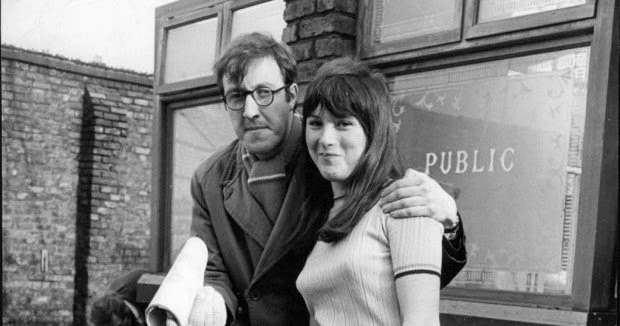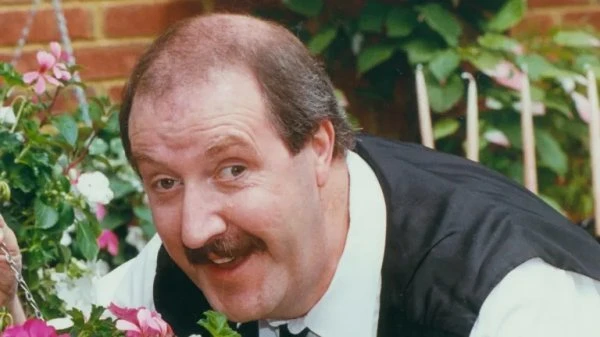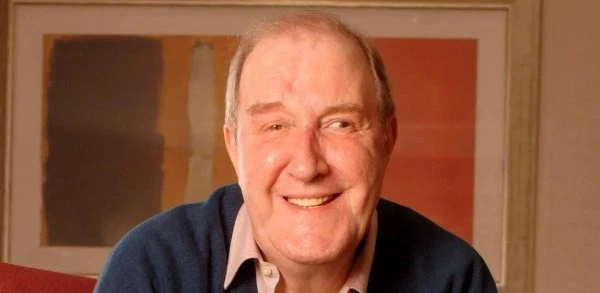
Gorden Kaye
Gorden Kaye biography by Brian Slade
They say that from small acorns mighty oaks grow, and if the old phrase can be applied to television stardom then we need look no further than much-loved comic actor Gorden Kaye for supporting evidence. A handful of bit parts in various David Croft productions made such a good impression on the comic writer that Kaye was eventually handed the starring role in ‘Allo, ‘Allo! and became a household name for the ten years the show was on screen.
Born with the more conventional spelling of Gordon, Kaye was born in Huddersfield during the Second World War. His parents came late to parenthood, Kaye being the only child of the family to a mother of 42 years old. He believed that his homosexuality was evident at an early age, describing himself years later as a ‘shy, gay and overweight boy.’ The family had no theatrical or entertainment roots, so Kaye would take ordinary hard labour jobs in mills and factories.
Despite his lack of training or theatrical background, Kaye found himself drawn to acting. When just 15 years old he tried his hand in a school production of Henry V, described by the school society as a, ‘somewhat inglorious appearance as Lord Scroop.’ It didn’t put him off though and he continued to perform, getting involved in hospital radio and a season of Alan Ayckbourn plays in his home town.
Kaye took the unusually direct approach of asking Ayckbourn for career advice. The great playwright pointed him in the direction of the Octagon Theatre in Bolton. His recitation of an extract from Next Time I’ll Sing to You, a new James Saunders play at the time about the 36-year isolation of a hermit drew unintended tears of laughter from its one-man audience, but it was enough to take him on.
During his early years of character acting, Kaye was taken into hospital for the removal of kidney stones. It came shortly after he had applied for his Equity union membership, where a typist had mistakenly registered his name as Gorden. His hospital visit came at a pace, so he was unable to correct the issue, and after waking up following his operation he found ‘Gorden Kaye’ written on the board above his bed, presumably identified from his personal belongings. He considered this an omen and never made the correction, taking the unusual spelling for the remainder of his career.

Kaye was grateful to be a character actor in those early days. ‘It’s useful being a character actor as there’s always something you can do,’ he once said, and he proved that with the variety of roles in his early years. His most notable success in the early days was in the long-running soap opera Coronation Street. Spotted by Pat Phoenix, who played the fiery-tempered Elsie Tanner, he was brought into the show in 1969 as her on-screen nephew, Bernard Butler, for 39 episodes. He remained in the programme until his character was written out, leaving the street after the attention of his affections, Irma Barlow, left for Australia.
The 1970s brought a good deal of jobbing actor roles for Kaye, but never the starring vehicle. Being a naturally shy man, stardom wasn’t something he craved, but a few roles that he took that seemed insignificant at the time would keep him on the radar for his career defining moment.

By series five of its eight-series run, It Ain’t Half Hot Mum was in full flow, and in an episode called The Pay Off, Gorden took an unnamed part of a disgruntled soldier among the audience of one of the gang’s shows. As Gunner Parkin bombed as a Coward-like comedian, Kaye’s character continually threw back the punchlines with contempt. It was a performance of only a handful of lines, but it put Kaye on the radar of series co-writer David Croft. Croft would turn to him three times in another smash hit, Are You being Served?, but the most promising of Kaye’s early involvement with Croft was in the one-series Mollie Sugden vehicle, Come Back Mrs Noah. Kaye played a news anchor reporting on the unfortunate events unfolding when Sugden’s housewife character is accidentally jettisoned into space. Although the show failed, Kaye’s own segments were extremely funny, being somewhat disconnected with the chaos of the main stories.
In 1980, Croft attempted to give Kaye the starring role that he had been waiting so long for. With Jeremy Lloyd he wrote Oh Happy Band!, intending Kaye to take the lead role of a village brass band conductor leading resistance against the building of an airfield through their village. Strike action at ITV sadly meant that Kaye would only be able to commit to the pilot episode and so the role written with Gorden in mind went to Harry Worth. It was perhaps a blessing in disguise as the show was a rare failure for Croft, ending after only one series.
Croft and Lloyd were trying frantically to find a new programme to replace Are You Being Served?, which both felt was being kept on at the expense of quality. After several false starts, they decided that a French resistance farce might fit the bill, and they turned immediately to Gorden Kaye for the lead role of René, a small café owner caught between the Germans and the resistance. Croft recorded the pilot at haste, believing that the scripts were so strong they needed to get it recorded before the idea was pounced upon by anybody else. Croft and Lloyd believed it was the best pilot episode they ever made.

‘Allo, ‘Allo! was a glorious success. Nearly twenty years prior, when Kaye had read for his audition in Bolton, he had read lines from a character of whom one review questioned, ‘Was he an idiot or a saint or a dirty old man?’ Ironically, the part of René could have had that same question directed at him. Hen-pecked by his wife, the wonderful Carmen Silvera as Edith whom René referred to as, ‘you stupid woman,’ his character flirted (and sometimes more) with every other female to cross paths with him. His resistance role involved him protecting some English airmen who had inadvertently landed nearby and sought refuge, while keeping the occupying Nazis unsuspecting of his resistance tendencies.

The pilot episode had been rushed out quickly because Croft knew that other commitments meant that he could not commit for another 18 months to make a full series. His faith was justified however and the programme was a roaring success. Criticism that it trivialised the resistance or indeed humanised the Nazis were dismissed by the programme’s supporters. The show was intended to be a lampoon of shows like Colditz or Secret Army, and as Kaye himself admitted, all characters within the programme are silly, be they French, German or English.
The programme couldn’t have been more successful. Stage shows were a sell-out wherever they went, ranging from Bournemouth Pier to Australia and including a hugely successful season at the London Palladium, with Kaye starring in an estimated 1,200 performances.

The television success was briefly interrupted in 1990. While driving in a gale force storm an advertising hoarding crashed through the window of Kaye’s car, threatening his life by becoming embedded in his head. Life-saving brain surgery was required and Kaye would never be able to recall details of the accident, although the heavy scar on his forehead would be a permanent reminder.
After some time in a coma, Kaye would be duped by a reporter masquerading as a hospital staff member into giving an interview. The subsequent legal action against the Sunday Sport, which Kaye lost, would be a much-referenced case when it came to privacy infringements, given that Kaye was not in a mental state well enough to consent to the pictures or story.

When ‘Allo, ‘Allo! ended in 1992, surprisingly Kaye largely disappeared from television screens. Aside from a 2007 one-off reflective of ‘Allo, ‘Allo!, his only appearances came in Revolver, a rather bizarre comedy sketch show that featured a host of performers of sitcom fame, but failed to enhance any of their careers. Instead, Kaye focussed on his charity work with the Water Rats, and his stage career, which included some particularly significant work such as Travels With My Aunt.
Kaye was a very private person, and sadly dementia forced him into a nursing home for the final two years of his life and he passed away in 2017 in comparative isolation. Although fame had come to him comparatively late in his career, Kaye embraced it and remained appreciative of René and the success of the ‘Allo, ‘Allo!. One of René’s many catchphrases was, ‘You may wonder what I am doing.’ Well we knew exactly what Gorden Kaye was doing – keeping the nation laughing for more than a decade as one of sitcom’s most legendary characters.

About writer Brian Slade
Born and raised in Dorset, Brian turned his back on a twenty-five-year career in IT in order to satisfy his writing passions. After success with magazine articles and smaller biographical pieces, he published his first full-length work, `Simon Cadell: The Authorised Biography'.
Brian is a devoted fan of the comedy stars of yesteryear, citing Eric Morecambe, Ken Dodd, Harpo Marx and Dudley Moore amongst his personal favourites. He was drawn to the story of Simon Cadell through not only `Hi-de-hi!' but also `Life Without George', a programme he identified with having grown up in the Thatcher era.
Published on April 6th, 2020. Written by Brian Slade for Television Heaven.









